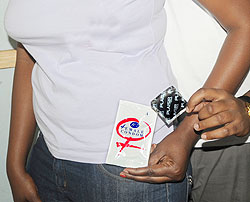Over ten secondary schools yesterday convened at Lycee de Kigali to debate the accessibility of condoms in schools. The debate comes after the launch of a new advocacy campaign to ease access to condoms among secondary school students, an exercise championed by various non-governmental bodies.


Over ten secondary schools yesterday convened at Lycee de Kigali to debate the accessibility of condoms in schools.
The debate comes after the launch of a new advocacy campaign to ease access to condoms among secondary school students, an exercise championed by various non-governmental bodies.
Grace Uwamahoro, the Head Girl of Fawe Girls School, stated that students are human and thus occasionally fail to control their sexual desires, therefore calling for access to condoms in schools.
"We know we need to abstain and we are even aware of the consequences of unprotected sex, but with or without condoms in schools, some students will still engage in sex, so it’s better for them to have it safe,” Uwamahoro said.
She added that if students have no access to condoms, it will only retard the nation with increasing number of school dropouts, unwanted pregnancies, illiteracy, poverty and abortions.
Uwamahoro observed that she is aware that last year, 660 students dropped out of school in Rwanda, as a result of unwanted pregnancies, a factor that impedes national development.
Fideline Kubwayo, a senior five student at Lycee de Kigali however disagreed with her.
She said that if condoms are distributed in schools, it will only stimulate students’ desire to try out sex since the condoms would be easily accessible and the consequences invisible.
A senior four student at King David School, Jesh Tugume, stated that the organisations calling for condom accessibility in schools should instead focus on sensitisation and encourage abstinence.
"It could be true that some students are having unprotected sex, but the number of students engaging in sex will only increase if they have easy access to condoms,” Tugume said.
David Niyonsaba, a senior five student at Lycee de Kigali School, said that if schools accept accessibility of condoms, they will be forsaking and acting contrary to the Rwandan culture.
Niyonsaba added that in the Rwandan culture, sex is sacred, forbidden from students and strictly for the married.
He said the accessibility will encourage promiscuity and early sex.
Ends


